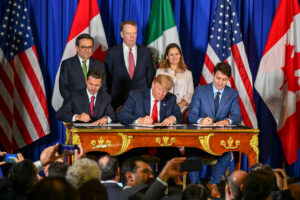The existence of only two legal gun shops in Mexico illustrates the nation's ongoing struggle with firearm regulation. Customers face bureaucratic hurdles to obtain firearms, as the country seeks to control widespread illegal weaponry while acknowledging citizens' rights to own guns.
Mexico's Unique Gun Ownership Landscape: Two Stores, One Complex Reality

Mexico's Unique Gun Ownership Landscape: Two Stores, One Complex Reality
In a country where gun ownership is constitutionally protected, legal firearm access is primarily limited to two military-regulated shops, reflecting a complex relationship with guns amidst rampant black market activity.
In Mexico, the gun ownership debate is heavily nuanced, woven into a broader context of violence and regulation. The Mexican Constitution grants citizens the right to own firearms; however, accessing them legally poses significant challenges, with only two official military-operated stores serving the entire nation. These shops are strategically situated in Mexico City and are meticulously regulated to curb the proliferation of illegal arms, which are often smuggled across the U.S. border.
Acquiring a gun requires extensive paperwork, with prospective buyers waiting months for approval. Many have made arduous journeys to the capital to purchase their weapons. For instance, Cristian Ulices Ocaranza Marquez, a municipal police officer from Colima—one of Mexico’s states with the highest homicide rates—rented a van with fellow officers for an eight-hour drive, illustrating the lengths to which individuals will go to secure legal firearms.
The contrast between legal and illegal gun ownership is stark. While the legal channels are tightly controlled, a vast black market exists, filled with American-made weapons. This disparity fuels a contentious debate: on one hand, many citizens—including law enforcement members—advocate for the right to bear arms for self-protection. On the other, the government's stringent regulations reflect a commitment to combatting increasing violence and maintaining public safety.
These military-run stores are not just retail outlets; they symbolize a complex interplay between citizen rights and governmental control. With applicants needing to provide numerous documents, and the process taking substantial time and financial resources—an average gun purchase can amount to more than a month's salary—the legal gun ownership journey in Mexico is challenging.
As more people grapple with the risks and realities of gun ownership in a country where legal access is becoming increasingly difficult, the conversation surrounding firearms continues to evolve. Citizens remain divided, caught between the desire for personal safety and the pressing need for effective regulation in a nation struggling with rampant violence and a thriving illicit arms trade.





















